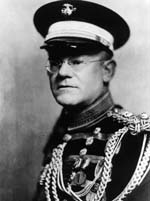 Taylor Branson, 20th Leader of the Marine Band, was born in Washington, D.C., on July 31, 1881. He studied the violin under then-musician William H. Santelmann and Herman Rakeman, a well-known Washington violinist. He studied the clarinet with Andrea Coda who was solo clarinet with the Marine Band and composition with Arthur Tregina, a former Marine Band member.
Taylor Branson, 20th Leader of the Marine Band, was born in Washington, D.C., on July 31, 1881. He studied the violin under then-musician William H. Santelmann and Herman Rakeman, a well-known Washington violinist. He studied the clarinet with Andrea Coda who was solo clarinet with the Marine Band and composition with Arthur Tregina, a former Marine Band member.
Branson enlisted as a private in the Marine Band Sept. 21, 1898, just before the close of the Spanish-American War. The 17-year-old later became solo violinist with then-Marine Symphony Orchestra and was director of the Gridiron Club Orchestra. He served as Second Leader from June 1, 1921, until he was named the 20th Leader on May 2, 1927 and commissioned a captain on June 7, 1935.
Branson composed several marches, including "Marine Corps Institute"; "Tell it to the Marines"; and "Eagle, Globe, and Anchor."
In 1922, when radio broadcasting was in its infancy, Branson became identified to radio fans across the country as the leader of the orchestra of “The President’s Own” that broadcasted from Station NOF, Naval Air Station, Anacostia, Washington, D.C. In 1931, Branson inaugurated “The Dream Hour” radio program, the longest running radio program of its kind. It was intended to bring the music of the Marine Band from the John Philip Sousa Band Hall to invalid shut ins. The March 28, 1940, broadcast of the “Shut-in Program,” as “The Dream Hour” became, was in honor of Branson’s more than 40 years of service. In attendance at the Band Hall was then-Marine Corps Commandant General Thomas Holcomb. President Franklin D. Roosevelt sent a letter of appreciation:
It has come to my attention that you are today being ordered home to
await retirement on April 1, 1940, for physical disability incident to over
forty years’ service in the Marine Corps. I wish to take this opportunity to
express to you my deep appreciation of the service you have rendered as
leader of the Marine Band, many details of which were closely connected
with White House functions, the rendition of honors to important visiting
personages and numerous other allied ceremonies.
Your cheerful, efficient and most cooperative efforts have inspired the
most favorable comment on every hand, and I desire to add my personal
thanks at this time to those of so many others.
I am certain that the members of the Marine Band will miss your able
leadership as much as your absence from White House events will be
noted here, and may I say to you that you have my every wish for many
years of life and happiness.
On June 3, 1937, Colombian Minister Miguel Lopez-Pumarejo conferred the “Cross of Boyaca” upon Branson “in recognition of your untiring efforts in the promotion of closer cultural relations between the peoples of Americas, by means of the diffusion of Latin American music in the United States.”
Branson was undoubtedly proud of his membership in the Marine Band. Upon his retirement he said, “I believe that the Marine Band has done more than any other for the appreciation of good music throughout the land. Through our broadcasts, home concerts, and tours the organization has made what I feel is a valuable contribution to Americana.”